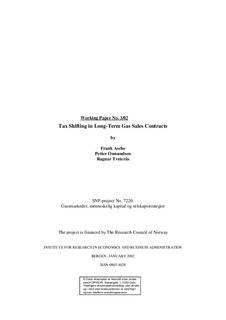| dc.description.abstract | Producers or consumers faced with an increase in taxes are usually able to shift parts of it to other levels in the value chain. We examine who are actually bearing the burden of increased taxes on natural gas in the EU-area - consumers or exporters. Strategic trade policy and cross-border consumer tax shifting are of particular interest, as the EU-area increasingly is a net importer of gas. Traditional tax incidence theory presumes spot markets. Natural gas in the EU-area, however, is to a large extent regulated by incomplete long-term contracts. Still, spot market forces could be indicative for tax shifting, by determining the ex post bargaining power in contract renegotiations. By examining tax shifting in gas sales data we test whether this is the case. To investigate tax incidence, we estimate natural gas demand elasticities for the household sector in EU countries as well as a reduced form import equation. We test whether gas import prices, which are predominantly determined by long-term contracts, have been influenced by end-user tax shifts. | en |
